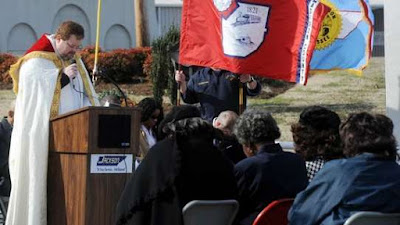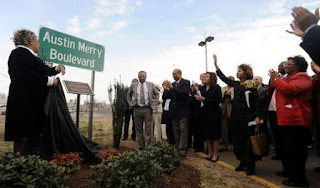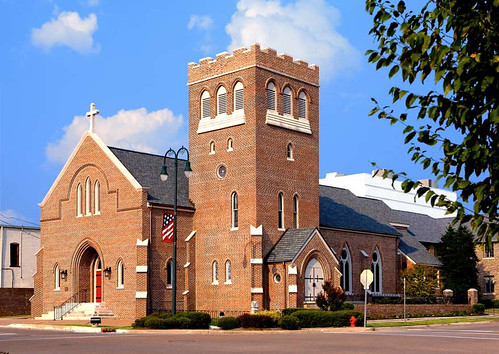
Did you know that the first Easter Eucharist at Saint Luke’s is on Saturday, April 11 at 7 PM? It is an annual service called The Great Vigil of Easter, and is a foundational service for every other service of the Church year. And yet, many Episcopalians are unaware of it.
I once served a parish where the rector had members of the parish to a celebration at his house each year after the Great Vigil of Easter. He reckoned that it was one of the only ways to get the parish to change its mind about the Great Vigil was to make the ticket to entrance to the party at his house participation in the Great Vigil. Kiezha and I have often thought that we’d like to implement his method, and yet have realized we can’t quite make that happen with two children under four years of age.
When I was a new Episcopalian years ago, I was invited to a Great Vigil of Easter, and I had no idea what I was about to celebrate. (The Presbyterian Church I grew up in had no such celebration.) Goodness, was I surprised, and perhaps you will be as well.
What in the world is The Great Vigil of Easter? To begin with, it is the service that begins our celebration of The Great Fifty Days of Easter. It is also the third part of a three part service that includes Maundy Thursday, and Good Friday. Perhaps most importantly, it is an ancient feast. If the Christian Passover or Paschal Vigil does not date to New Testament times, it can certainly be documented early in the Second Century A.D., and yet, many Episcopalians haven’t experienced this service. In their haste to remove all things “Catholic,” the Reformers unfortunately didn’t restore this ancient and central feast of the Church, which hadn’t survived in its ancient form in the Roman Catholic church. It did survive these many centuries intact in the Eastern Orthodox church. However, for Anglicanism, the Easter Vigil, like the other Holy Week services, was reintroduced in the wake of the Oxford Movement of the 1800s.
The 1979 Book of Common Prayer recovered the ancient Vigil, the keystone about which the rest of the Church Year is built, and through careful liturgical scholarship, the Great Vigil has been restored in the majority of the churches of the Anglican Communion, along with the Lutheran Churches throughout the world.
The Great Vigil of Easter has four parts:
The service of Light
The service of Lessons
The service of Christian initiation
The celebration of Holy Eucharist
The service of Light begins with the kindling of the new Paschal (Easter) Fire. Right there in our courtyard we light a fire in our special fire-pit and light our brand new Paschal (Easter) candle, which remains next to the Baptismal font year round and is lit throughout the season of Easter, at Baptisms and at funerals. Once the paschal candle is lit, participants are given a hand candle to hold throughout the service of lessons. We process into a darkened church, singing “The light of Christ. Thanks be to God.” Our cantor then sings a song called The Exsultet which is an ancient prayer for light.
Then we experience the service of Lessons wherein we will hear three readings each followed by a canticle, psalm, or hymn. (We have the option to do as many as nine lessons, but for the sake of time, Saint Luke’s keep it at three.) These readings include the story of Creation, Israel’s deliverance at the Red Sea.
After the service of Lessons comes the service of Christian initiation, also known as Holy Baptism. The candidates for Holy Baptism are presented and baptized. Baptism is the theological climax of the Great Vigil, for as the Apostle Paul writes, “Do you not know that all of us who have been baptized into Jesus were baptized into his death? Therefore we have been buried with him by baptism into death, so that, just as Christ was raised from the dead by the glory of the Father, we too might walk in newness of life. For if we have been united with him in a death like his, we will certainly be united with him in a resurrection like his.” Romans 6:3-5
Then, after the newly Baptized are presented, the candles are extinguished, the lights come on and we say, “Alleluia, Christ is risen! The Lord is risen indeed. Alleluia! At this time we make what is called “The Great Noise” and sing our Easter songs. We invite you to bring any noisemakers you might have at home such as a musical instrument, or anything that makes noise so that you can join with us as we proclaim that it is Easter and Christ is risen, indeed!
Finally, the church, renewed and increased by the addition of the newly baptized, makes eucharist, as we join in celebrating the first Easter Eucharist and in receiving Christ’s Body and Blood. It is all there. Not with the drama of Palm Sunday and Good Friday, but with the solid symbols of faith, fire, light, water, bread and wine, and with the proclamation of the Word of God. In the Great Vigil of Easter, we pass over with Christ from death to life, and with the church from Lent to Easter.
If you haven’t experienced the Great Vigil of Easter, I invite you to do so. This service holds all of the power, mystery, and specialness of our Christmas Eve midnight service, and is a beauty to behold. I shant incentivize your participation, but it is well worth your time. So come and join in the Church’s ancient feast and be brought again from death into new life.
Easter Blessings,
Sean+





















